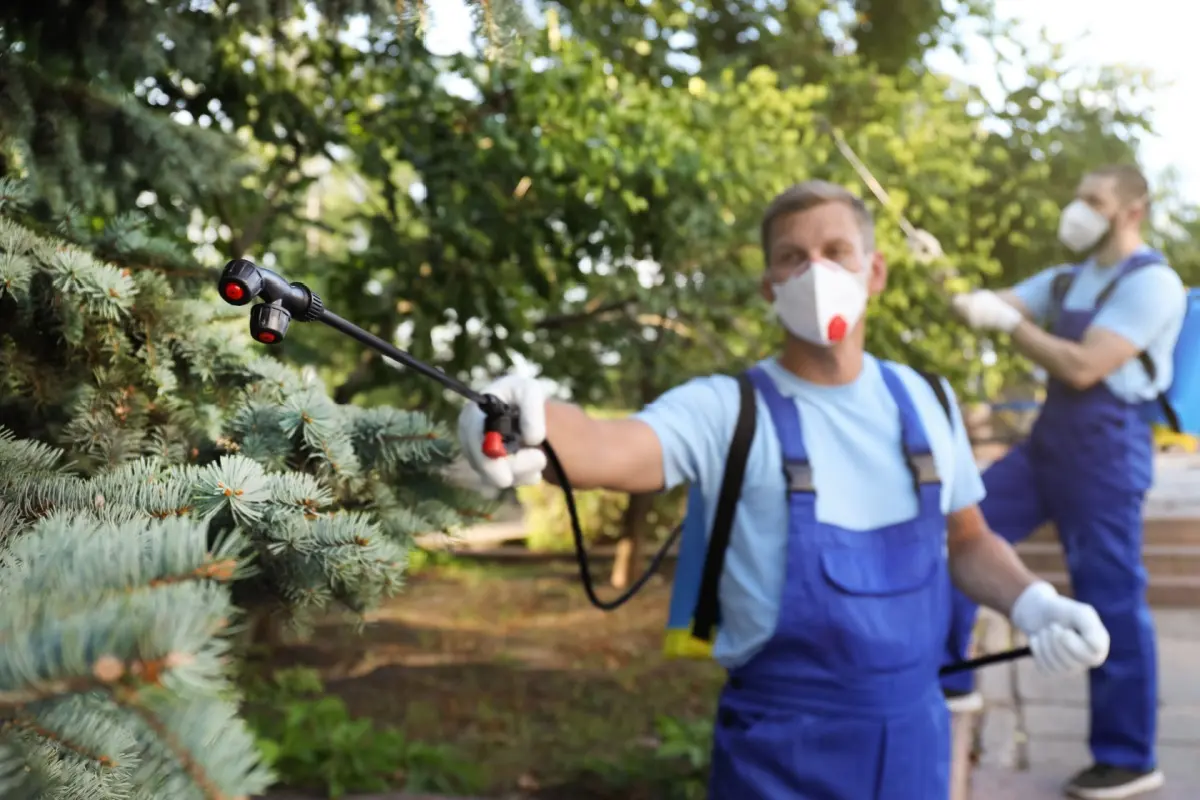Table of Contents
- What Licenses are Needed to Start a Pest Control Business?
- Pest Control License Requirements by State
- Steps to Become a Licensed Contractor
- How Long Does It Take to Get Your Pest Control License?
- How Much Does a Pest Control Business License Cost?
- Potential Consequences of Operating Without the Appropriate Licenses
Rodents and insects can be profitable little buggers — if you’re in the business of eradicating them. The U.S. pest control industry trends include more than 33,380 businesses that are worth over $24.2 billion, revenue driven mostly by offering services that control and eliminate pesky bedbugs, termites, and mosquitoes.

Before you start spraying and zapping bugs to earn your share of potential profits, there’s a key step to starting a pest control business you can’t skip: obtaining the necessary licenses. All U.S. states require pest control contractors to have the proper certifications and licenses to open their businesses.
What education requirements must you follow? We explain how to get your license in detail below.
What Licenses are Needed to Start a Pest Control Business?
Pest control certification requirements depend on your role and the type of work you will perform. For example, your business may need a license to offer pest control services, and your employees may need individual licenses and certifications to apply or supervise the application.

Generally speaking, pest control licenses can be broken down into one of the following categories based on the services performed:
- Pesticide applicator commercial license: Required for applicators applying pesticides in exchange for money, including those who sell services or supervise other applicators. This license authorizes contractors to manage pests in homes, buildings, and other structures. Applicants must pass an exam, and they can select certain categories for further customization.
- Pesticide dealer: Required to sell pesticides to certified or licensed end users. Must be renewed annually.
- Aerial applicator: Required to apply pesticides by air. Applicants must also have a license issued by the Federal Aviation Agency (FAA), and contractors must be supervised by a licensed pilot.
- Consultant: Required to offer supplies, advice, or recommendations of specific pesticides. Applicants must also have a four-year agricultural or biological science degree from an accredited college.
- Pesticide certification for private applicators: Required for private farmers, ranchers, and growers who want to apply restricted-use pesticides on their land. Applicants must pass an exam and renew the certification every few years.
The licenses required to start a pest control business will vary by state, and unless the state offers reciprocity, a license issued by one state is typically only valid within that state. (More on this later.)
Types of Pest Control Licenses
To become a qualified pesticide applicator, you must demonstrate proficiency in applying many types of pesticides in different environments. When getting a license, you can customize your education by subjects most relevant to your job or business offerings. For example, the aquatic category signifies expertise in safely applying pesticides in lakes, rivers, and ponds.
Here are the categories you can choose as part of your pesticide applicator training.
- Residential, Industrial, Institutional
- Landscape Maintenance
- Right-of-Way
- Plant Agriculture
- Forest
- Aquatic
- Regulatory
- Seed Treatment
- Animal Agriculture
- Demonstration and Research
- Health Related
- Soil Fumigation
- Non-Soil Fumigation
- Maintenance Gardener
Insurance Coverages and Bonds a Pest Control Company Needs
In addition to skill-specific licenses, all pest control businesses must have bonds and insurance coverage. Certain licenses may require proof of liability insurance or surety bonds to protect clients and the public. These financial safeguards protect your company and your customers from potential liabilities.

It’s a good idea to get a business insurance so that you and your employees are protected against injuries and illnesses from pesticide exposure, or if a customer is unhappy with your services. Such protections help safeguard your business in the event of unexpected incidents.
Many states also require you to have general liability insurance to apply for a license. This insurance protects your business from bodily injury, property damage, or personal injury claims. It can also cover legal fees, medical expenses, and damages incurred on a client’s property.
Other common insurance plans for businesses in this industry include:
- Workers’ compensation insurance, which protects your employees during work-related injuries or illnesses.
- Professional liability insurance, which protects your business from claims of negligence.
- Commercial auto insurance, which covers theft, vandalism, accidents, and property damage caused by your business vehicles.
If you operate a pest control business in California, Tennessee, Arkansas, or Alabama, you’ll also need to obtain a surety bond as part of the licensing process. A surety bond is a contractual agreement between three parties:
- Your business (the principal)
- The state licensing authority or client (the obligee)
- The bond issuer (the surety)
The bond guarantees that your company will adhere to industry standards and regulations. The bond can compensate for damages or losses if your company fails to comply with laws or contractual obligations. You’ll pay a premium for the bond, which is usually between 1% and 10% of the bond amount, depending on your credit score.
Pest Control License Requirements by State
This table summarizes the license requirements for starting a pest control business:
| State | Pest Control Experience Required | Pest Control Exam Required |
| Alabama | Yes | Yes |
| Alaska | Yes | Yes |
| Arizona | Yes | Yes |
| Arkansas | Yes | Yes |
| California | Yes | Yes |
| Colorado | Yes | Yes |
| Connecticut | Yes | Yes |
| Delaware | Yes | Yes |
| Florida | Yes | Yes |
| Georgia | Yes | Yes |
| Hawaii | Yes | Yes |
| Idaho | No | Yes |
| Illinois | Yes | Yes |
| Indiana | Yes | Yes |
| Iowa | No | Yes |
| Kansas | No | Yes |
| Kentucky | No | Yes |
| Louisiana | Yes | Yes |
| Maine | No | Yes |
| Maryland | Yes | Yes |
| Massachusetts | Yes | Yes |
| Michigan | Yes | Yes |
| Minnesota | Yes | Yes |
| Mississippi | Yes | Yes |
| Missouri | No | Yes |
| Montana | No | Yes |
| Nebraska | No | Yes |
| Nevada | Yes | Yes |
| New Hampshire | Yes | Yes |
| New Jersey | Yes | Yes |
| New Mexico | Yes | Yes |
| New York | Yes | Yes |
| North Carolina | Yes | Yes |
| North Dakota | No | Yes |
| Ohio | Yes | Yes |
| Oklahoma | Yes | Yes |
| Oregon | Yes | Yes |
| Pennsylvania | Yes | Yes |
| Rhode Island | No | Yes |
| South Carolina | Yes | Yes |
| South Dakota | Yes | Yes |
| Tennessee | Yes | Yes |
| Texas | Yes | Yes |
| Utah | Yes | Yes |
| Vermont | Yes | Yes |
| Virginia | Yes | Yes |
| Washington | Yes | Yes |
| Washington, DC | Yes | Yes |
| West Virginia | Yes | Yes |
| Wisconsin | Yes | Yes |
| Wyoming | Yes | Yes |
Note: Licensing requirements are subject to change. Consult your state’s regulatory agency for the most current information.
Steps to Become a Licensed Contractor
Getting a license typically requires applying for the proper license with your state agency and taking (and passing) an exam. If you are also getting a business license, you’ll need to get the required insurance and bonds. Here’s a step-by-step guide.
1. Research State-Specific Licensing Requirements
Thoroughly research the licensing requirements in your state by visiting your state’s official regulatory agency website to determine the required licenses, the examination fees, and any specific qualifications you must meet to get the license. For example, the Florida Department of Agriculture and Consumer Services has a detailed webpage explaining how to get certified for pest control in Florida.
Determine the specific licenses you need based on the services you’ll offer and the required prerequisites for education or experience. Make a list of all necessary documents, such as proof of education, work experience, and background check.
2. Assess Educational and Experience Requirements
To become certified in pest control, most states require at least a high school diploma or GED. Some states require additional coursework in related fields like entomology, biology, chemistry, or environmental science. For example, the California Department of Pesticide Regulation considers education in biological sciences an approved substitute for some experience requirements.
Keep detailed records of your work experience, including dates, employers, job duties, and hours worked, so you can use them to meet the experience qualifications in certain states. Some states may also require background checks or fingerprinting as part of the licensing process.
3. Complete State-Approved Training Programs
These programs typically cover pest identification, pesticide chemistry, application techniques, integrated pest management (IPM), safety protocols, pest control tools, and state and federal regulations.

You can find state-approved training programs from local community colleges, vocational schools, and industry associations. Many states follow the standard set by the EPA’s National Pesticide Applicator Manual. Completing these programs is often required as part of the licensing process.
4. Pass Licensing Exams
As stated above, general/core or category-specific exams are part of getting a pest control license. The general/core exam covers the fundamentals of pesticide laws, safety, environmental protection, and basic pest management procedures. Category-specific exams focus on specialized areas like fumigation, agricultural, structural, and public health-related pest control.
Most certifying programs allow you to download their training materials and study guides to help you prepare for the exam. When you’re ready to take the test, you’ll register for the exam, pay the fees, and take the test. You’ll need a grade of 70% or 80% to pass the exam, and you may be able to retake the exam three times if you fail.
5: Get Insurance and Surety Bonds
Most states require you to have general liability insurance and surety bonds to get a pest control license for your business. Insurance minimums and surety bond amounts vary by state. North Carolina requires insurance coverage of at least $100,000, while California requires a $12,500 surety bond for structural businesses.
6. Submit Your License Application
After meeting all requirements, you’ll submit your application to the proper authority according to your state’s guidelines, such as the State Department of Agriculture, Department of Health, or Department of Environmental Quality.
In the application, you’ll provide proof of education, training certificates, exam scores, insurance and bond documents, and records detailing your related experience. Then, you’ll pay the application fees.
Keep copies of all documents and note any reference numbers or confirmation emails. Before performing any pest control services, you must wait until your license is issued.
7. Renew Your License as Needed
Licenses need to be renewed after a certain period of time. Some are only valid for one year, while others are valid for five years. To maintain your license, you must renew it before it expires by completing any required continuing education units (CEUs), submitting a renewal application, and paying the applicable fees according to your state’s regulatory agency.
How Long Does It Take to Get Your Pest Control License?
When planning to get a license, please note that it may take several months if it is your first time obtaining one. Some states require shadowing a professional for an extended period of time before taking the exam. Most exam results are available 10 days to several weeks after taking the test, but it can take longer for the state to process the license.
The total time to pass the requirements depends on your prior experience in the industry and your readiness to pass the exams and complete the training programs. Allocate enough time to register for the exam, study the materials, and submit the application.
How Much Does a Pest Control Business License Cost?
The cost to apply for a license ranges from about $25 to $100, but this varies significantly by state. Additional costs include:
- Exam fee: $10–$250, plus additional costs per special category training
- Renewal fees: $20–$380
- Business licensing fees: $50–$500
Expect to spend $1,000 to $3,000 on initial investments to get a business license and pay for the exam and your initial insurance premium.
It’s worth mentioning that your customers will need to pay a hefty fee like that, and many won’t have the cash upfront. Offering pest control financing to your customers will make it easier to get started.
Potential Consequences of Operating Without the Appropriate Licenses
Obtaining the right licenses and certifications is a legal requirement, but it also helps you build trust with clients because you can provide proof of your expertise. In fact, operating a pest control business without the necessary licenses is illegal in most states. The consequences of operating without the appropriate licenses can impact your company’s reputation and eliminate your ability to operate in the future.
The pest control industry is heavily regulated due to the risks pesticides pose to the public and the environment. Regulatory agencies can impose penalties, which include hefty fines and, in some cases, misdemeanor or felony charges—especially if the actions result in significant harm or involve the misuse of restricted pesticides.
Without adequate licensing, you also increase your vulnerability to civil lawsuits because you won’t be protected if your services result in property damage or personal injury and the customer sues.
Beyond financial and legal consequences, your business runs the risk of earning a bad reputation and fueling distrust when people can’t confirm your industry knowledge and track record. This type of exposure will make it harder for you to earn new business and generate positive customer reviews.
Getting a pest control license is a legal requirement, and it represents a way to ensure your business is protected as it grows. While the certification process involves dedication and financial investment, it equips you with the knowledge to operate safely and sets the foundation for a reputable and successful business. Take the time now to research the licensing requirements in your state so you can focus on building a business that’s known for its expertise and exceptional service.
Disclaimer: This article is intended for informational purposes only and does not constitute legal or financial advice. Licensing requirements and regulations are subject to change. Always consult with a legal professional or your state’s regulatory agency for the most up-to-date information.
Table of Contents
- What Licenses are Needed to Start a Pest Control Business?
- Pest Control License Requirements by State
- Steps to Become a Licensed Contractor
- How Long Does It Take to Get Your Pest Control License?
- How Much Does a Pest Control Business License Cost?
- Potential Consequences of Operating Without the Appropriate Licenses


